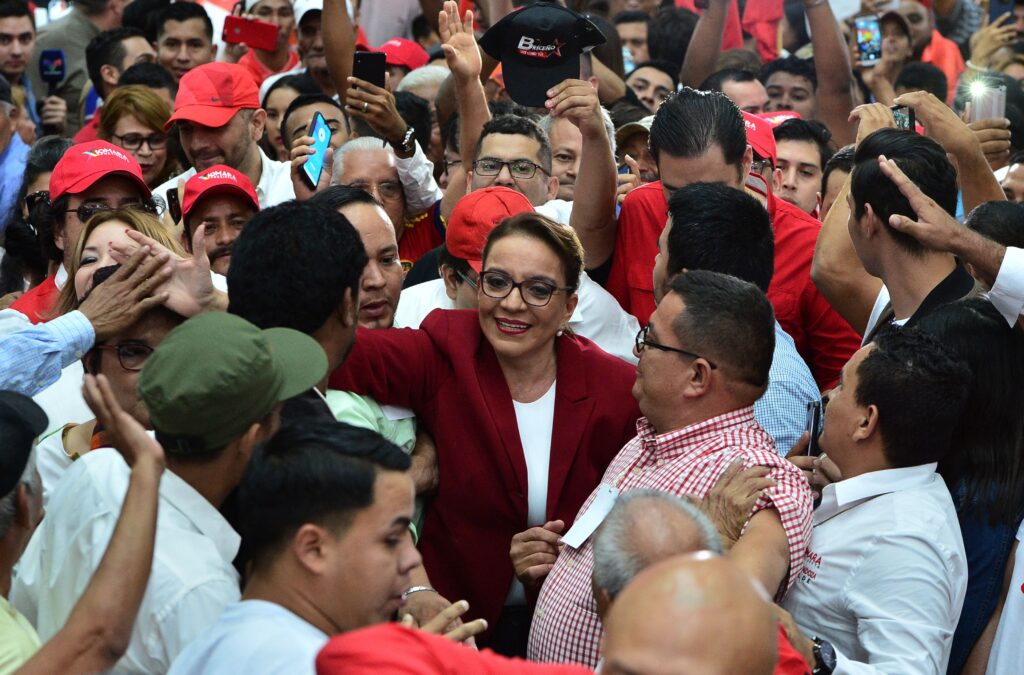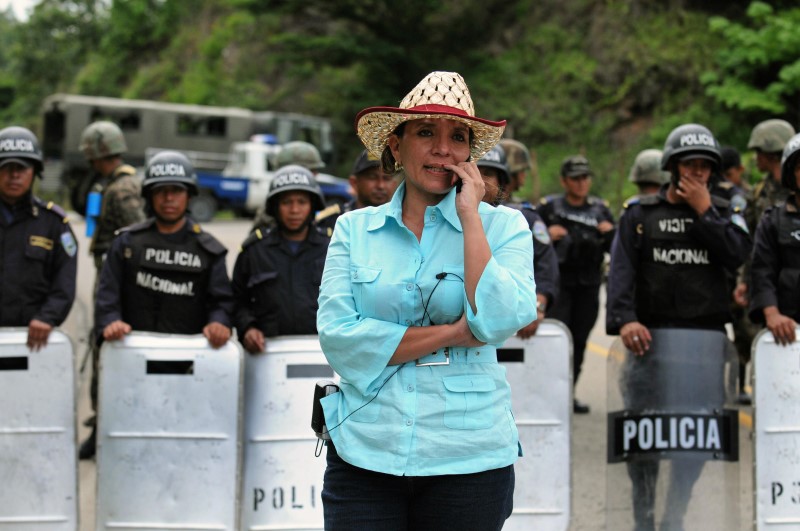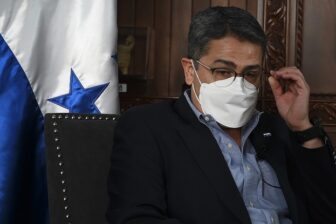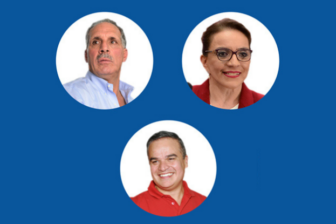In Honduras’ presidential election on November 28, Xiomara Castro de Zelaya could make history in an already historic year: Her victory would make her the first woman to lead the nation since it declared independence from Spain 200 years ago.
A self-described democratic socialist and wife to former President Manuel “Mel” Zelaya, Castro was the runner-up in the 2013 presidential election. She finished second as the vice-presidential candidate for TV personality Salvador Nasralla in 2017, a ticket that lost by 50,000 votes in a disputed vote that reelected President Juan Orlando Hernández. This year, she’s running again and has emerged as the opposition’s best shot at ending the ruling National Party’s 12-year hold on the presidency.
Castro’s campaign got a huge lift when Nasralla ended his own campaign on October 13 to back Castro. The smaller Innovation and Social Unity Party also joined the informal alliance endorsing Castro’s bid.
“This important act reflects the will of a people demanding unity, especially within the opposition, in order to defeat the dictatorship,” Castro said at a press conference, with Nasralla beside her.
Polls gave Castro a shot even before the backing of Nasralla, who had been running in third. In a September CID-Gallup poll, Castro registered 18% support, not far behind the National Party’s Nasry Asfura at 21%. A few public polls showed Castro leading. In the single-round election, a mere plurality is enough for victory.

Castro has proposed some big changes for the crisis-stricken country, including a referendum to propose rewriting the constitution, switching diplomatic ties from Taiwan to China, and the creation of a UN-backed anti-corruption commission similar to Guatemala’s once successful CICIG.
For many, however, the self-described “revolutionary” Castro would be far from a fresh start. Before he was removed in a 2009 coup d’état, her husband had brought Honduras closer to Venezuela’s Hugo Chávez, and much of the business establishment still fears that the Zelayas want to pick up where they left off. In her campaign, Castro is trying to strike a more moderate tone in meetings with private sector leaders. As for what she wants to repeat from her husband’s presidency, she points to the reductions in poverty during those years.
“Most of her policies,” said economist Roberto Lagos, “are related to reducing poverty and inequality. This message is connecting with voters.”
Winning may be the easy part
After 12 years of one party, “Honduras needs an alternation in power,” said Dr. Rolando Sierra Fonseca, the director of FLACSO Honduras. Whoever wins will have their work cut out for them. The pandemic pushed some 400,000 Hondurans out of work in 2020, and back-to-back hurricanes late last year affected half of Honduras’ population and caused some $1.9 billion in damages. Much of the country wants to migrate, including six out of ten millennials. Castro would also inherit one the continent’s worst energy crises. Meanwhile, the IMF projects public debt will rise to 58.7% of GDP this year, up from an estimated 54.5% making it harder to finance public projects.
Castro will need to fight to implement her agenda in Congress. Nasralla is still asking his supporters to vote for his party’s congressional candidates. That means Honduras’ three main opposition forces, including the once-powerful but still relevant Liberal Party, are each likely to have representation in Congress. If they don’t work with Castro, they could prove a roadblock to some of her signature proposals.
Castro would also have to contend with institutions shaped by the National Party’s decade-plus control.
“After 12 years, the bureaucracy is clearly aligned with the National Party, from the police to teachers to the health sector,” said Lester Ramírez Irías, the director of governance and transparency at the Association for a More Just Society, an NGO.

Photo: ORLANDO SIERRA/AFP via Getty Images
There are also fears Castro and Zelaya could seek vengeance for the coup that ousted him after he moved to replace the constitution. Castro became involved in politics shortly before her husband’s election and protesting the coup marked her political ascendance. The movement she organized became Liberty and Refoundation (LIBRE), the party under which she ran for president in 2013.
There are diverging opinions about the extent of Zelaya’s influence on a President Castro. Today, the candidate herself is talking less about the coup and more about defeating the National Party with the kind of big-tent model that helped LIBRE become Honduras’ second-largest political force.
Castro has been meeting with business groups, promising collaboration if elected and better conditions for job creation and investment.
“I want a social pact with every sector, the productive sectors, with business, with workers, with teachers, with farmers and campesinos, with the informal economy and small and medium-sized businesses,” Castro said when launching her campaign platform.
“She has been trying to send a message to the private sector about the need for a reconciliation government in order to develop an agenda for growth and inclusion,” said Lagos.
Courting the private sector as a socialist could have obvious limits, but there may be room for common ground on some issues, like the controversial Employment and Economic Development Zones (ZEDES). Hernández has pushed the semi-autonomous free trade zones and says they will attract investment. Business and civil society leaders say the zones put local sovereignty at risk. Castro is fiercely opposed.
A “transactional” relationship with the business sector is possible, unless her husband pushes her too far left, said Ramírez.
“If private business feels like Mel Zelaya wants to nationalize companies or pass policies around state control, there would be a strong reaction on their part,” Ramírez said.
Castro’s challenge is one recently faced by Peru’s Pedro Castillo, and soon by Colombia’s Gustavo Petro or Chile’s Gabriel Boric, leftist candidates who hope to take advantage of an anti-incumbent wave in the region while contending with the phantom of Venezuela’s economic collapse. That country’s economic and democratic decline has made any association with Chávez’s brand of “21st-century socialism” a serious handicap.
A repeat of 2009?
The fear of chavismo played a central role in Honduras’ political crisis in 2009. Still, analysts don’t predict a repeat of that kind of confrontation. The context in Honduras – and Latin America – has changed too much, analysts say.

Credit: Jose CABEZAS/AFP via Getty Images
Castro’s campaign “is not some movement to consolidate a dying 21st-century socialism movement,” echoed Ismael Zepeda Galo, an analyst and economist at the Social Forum on the External Debt and Development in Honduras, an NGO. Zepeda added that a Castro win wouldn’t signal an advance of the left so much as voters’ exhaustion with the ruling party.
A sense that lessons have been learned since 2009 underscores an optimism among some that a Castro presidency would end better than it did for her husband. “If they win, I think they will be able to govern,” said one of Zelaya’s former ministers, who asked not to be named. The minister pointed to signs of pragmatism from Castro.
“She has to build bridges and clarify things that might associate her with other leftist governments. She has to promote open markets, she has to support small businesses and entrepreneurs, and I think she is doing that,” said the ex-minister, who also expects the Zelayas to be willing to work with Democrats in Washington, even as some believe Democrats reacted insufficiently to the coup during the Obama administration. In recent years, trust between Honduras and the U.S. has eroded under Hernández, who is under investigation for drug trafficking in U.S. courts. Vice President Kamala Harris skipped Honduras on her visit to the region in June.
Among the possibilities, perhaps the most likely outcome of a Castro government is a sort of stalemate with a divided Congress and without the fiscal resources to enact big changes to the status quo.
“I don’t see the sectors that were in favor of the coup very willing to repeat a coup d’etat, given the consequences that followed,” said Sierra, the university director. “And I also think that LIBRE and Castro have evaluated that they can’t put forward a government of sweeping changes. The conditions aren’t there.”








